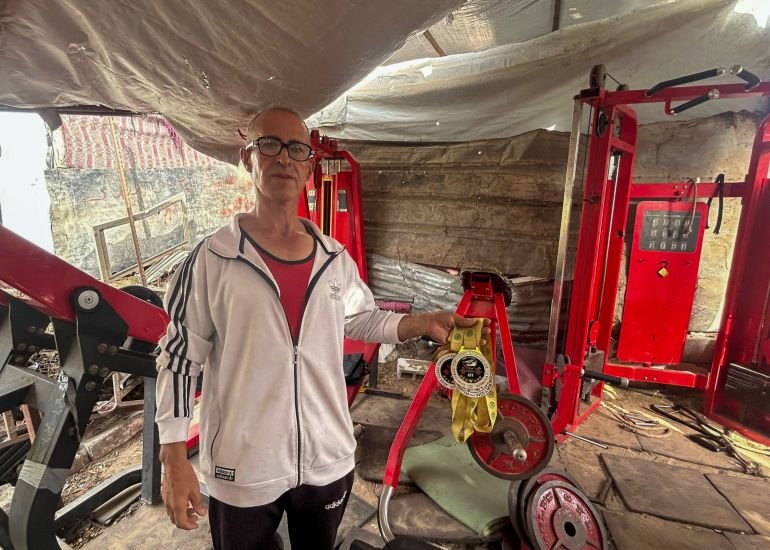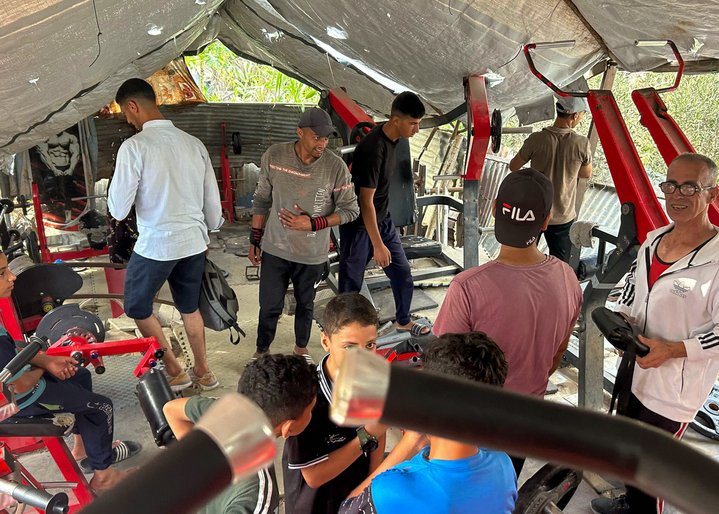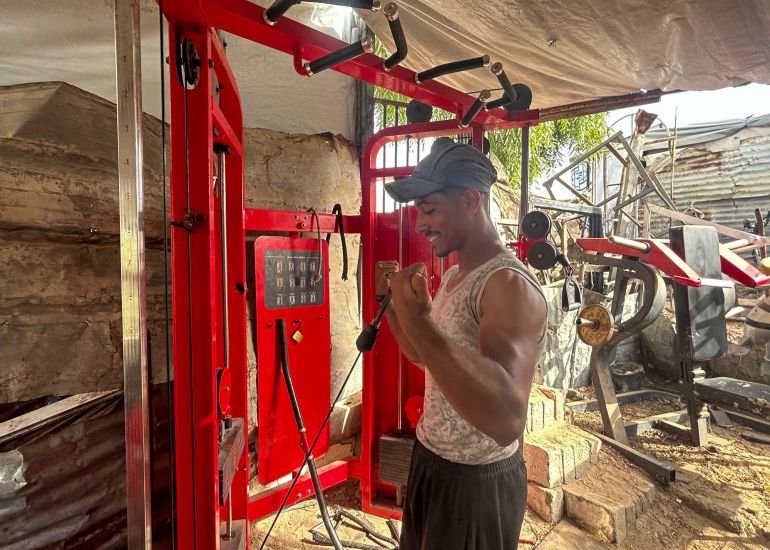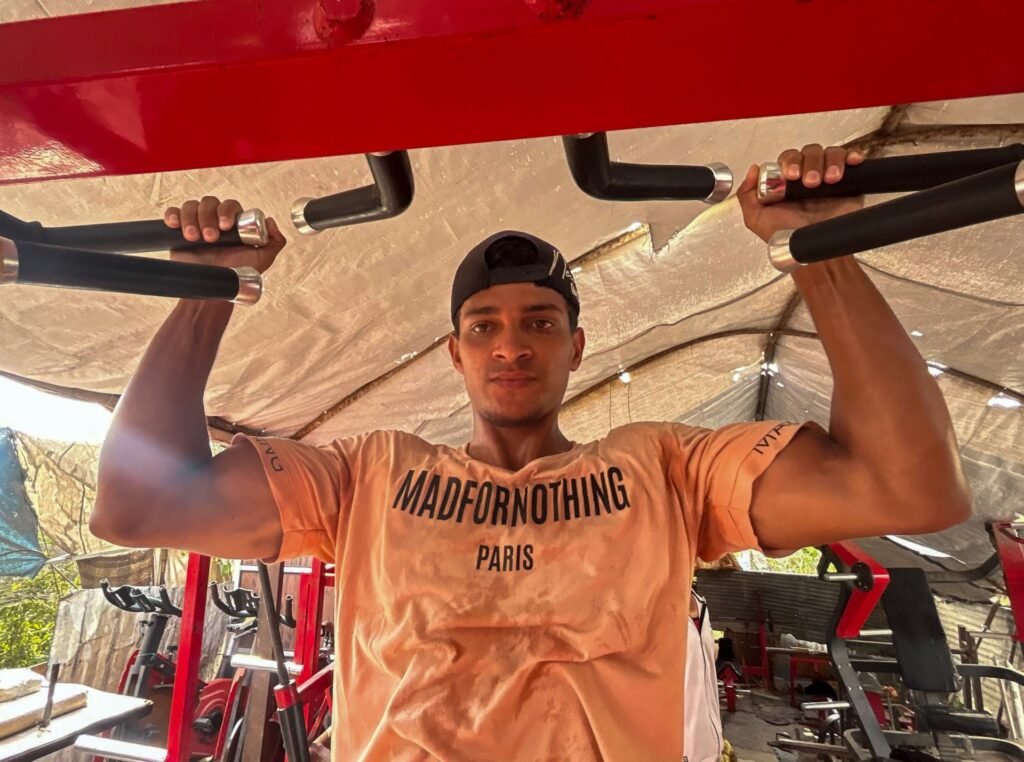Athletes train with salvaged equipment in a tent gym in al-Mawasi, desperately trying to maintain their physical strength during man-made famine conditions caused by Israel’s blockade of the Strip.
Al-Mawasi, Gaza Strip – Sweat streams down Tareq Abu Youssef’s face as he struggles through his gym workout on makeshift bodybuilding equipment, each movement more laboured than it should be.
The 23-year-old Palestinian deliberately keeps his training sessions minimal, a painful reduction from the intensive routines he once loved – but in a territory where nearly everyone is starving, maintaining muscle mass has become an act of survival and resistance.
“I have dropped 14 kilograms, from 72kg to 58kg (159lb to 128lb), since March,” Abu Youssef said, referring to when Israel tightened its siege by closing border crossings and severely restricting food deliveries. “But if eating has become an abnormality in Gaza, working out for bodybuilders like us is one rare way to maintain normalcy,” he tells media.
His story reflects a broader humanitarian catastrophe: Across Gaza’s 365 square kilometres, 2.1 million Palestinians face what aid agencies describe as deliberate, weaponised hunger.
The UN Office for the Coordination of Humanitarian Affairs (OCHA) reports that virtually the entire population faces “catastrophic” levels of food insecurity, with northern Gaza experiencing famine conditions. Doctors Without Borders, known by its French initials MSF, has documented severe acute malnutrition cases throughout the Strip, describing the crisis as “man-made” and deliberately imposed. The World Food Programme warns that without immediate intervention, famine will spread across all of Gaza, while millions of tonnes of aid are parked at Israel-locked border crossings.
Even when aid trucks manage to enter through Israel’s heavily restricted crossings, distribution of food and other essential items remains nearly impossible due to ongoing military operations and widespread destruction of infrastructure.
During Abu Youssef’s extended rest breaks in between machines – now five times longer than before Gaza’s famine began – he runs his hands over his chest, arms, and shoulders, feeling the devastating muscle loss that mirrors the physical deterioration of an entire population.
“Starvation has completely affected my ability to practice my favourite sport of bodybuilding,” Abu Youssef says in a tent gym in al-Mawasi, located in Gaza’s overcrowded southern “safe zone”. “I now come to train one day, sometimes two days, a week. Before the war, it was five to six days. I’ve also reduced my training time to less than half an hour, which is less than half the required time.”
Where he once bench-pressed 90-100kg (200-220lb), Abu Youssef now barely manages 40kg (90lb) – a decline that would be concerning for any athlete but devastating in a context where such physical deterioration is becoming the norm across an entire society.
A gym among the refugees
The makeshift facility where Abu Youssef trains exists inside a tent in al-Mawasi, now home to roughly one million displaced Palestinians living in overcrowded, unsanitary conditions. Here, amid sprawling refugee camps, coach Adly al-Assar has created an unlikely sanctuary, using equipment salvaged from his destroyed gym in Khan Younis.
Al-Assar, a 55-year-old international powerlifting champion who won six gold medals at Arab championships in 2020-2021, managed to rescue just 10 pieces of equipment from the more than 30 destroyed when Israeli forces bombed his original facility. The tent gym covers barely 60 square metres (650 sq ft), its plastic sheeting stretched over two uneven levels of ground, surrounded by refugee tents and sparse trees.
“During this imposed famine, everything changed,” al-Assar explains, his own body weight having dropped 11kg from 78kg to 67kg. “Athletes lost 10-15 kilograms and lost their ability to lift weights. My shoulder muscle was 40 centimetres, now it’s less than 35, and all other muscles suffered the same loss.”
Before the current crisis, his gym welcomed over 200 athletes daily across all ages. Now, barely 10 percent can manage to train, and only once or twice weekly.
One of those regular visitors to his makeshift gym is Ali al-Azraq, 20, displaced from central Gaza during the war’s early weeks. His weight plummeted from 79kg to 68kg – almost entirely muscle loss. His bench press capacity dropped from 100kg to just 30kg, back lifts from 150kg to 60kg, and shoulder work from 45kg to barely 15kg.
“The biggest part of the loss happened during the current starvation period, which began months ago and intensified in the last month,” al-Azraq says. “I actually find nothing to eat except rarely a piece of bread, rice, or pasta in tiny quantities that keep me alive. But we completely lack all essential nutrients and important proteins – meat, chicken, healthy oils, eggs, fish, fruits, vegetables, nuts, and others.”
The unemployed young man had hoped to compete in official Palestinian arm-wrestling championships before advancing internationally. Instead, he describes the current starvation as “the harshest thing we’re experiencing as Gazans, but athletes like us are most affected because we need large quantities of specific, not ordinary food”.

Training through trauma
Yet for these athletes, the tent gym represents more than physical training – it’s psychological survival. Khaled Al-Bahabsa, 29, who returned to training two months ago after being injured in Israeli shelling on April 19, still carries shrapnel in his chest and body.
“Sports give life and psychological comfort. We were closer to the dead even though we were alive,” al-Bahabsa says. “But when I returned to practice my [gym] training, I felt closer to the living than the dead, and the nightmares of genocide and hunger retreated a little.”
He was stunned to discover the gym among the tents and trees. “I considered that I got my passion that war conditions forced me to give up. Bodybuilding isn’t just a sport – for me and many of its players, enthusiasts, and lovers – it’s life.”
Twenty-two months of relentless bombardment by the Israeli military has killed more than 62,000 people, according to the enclave’s Ministry of Health, demolished expansive parts of the besieged territory, and displaced the sweeping majority of its people. Those alive are trying to survive dire humanitarian conditions in the near-absolute absence of food.
Al-Assar has adapted his training methods for famine conditions, strictly instructing athletes to minimise workouts and avoid overexertion. Rest periods between sets now extend to five minutes instead of the usual 30 seconds to one minute. Training sessions are capped at 30 minutes, and athletes lift no more than half their pre-famine weights.
“The recommendations are strict to shorten training duration and increase rest periods,” al-Assar warns. “We’re living a deadly starvation crisis, and training might stop altogether if circumstances continue this way.”

On a daily basis, athletes experience complications including collapse, fainting, and inability to move, the coach told media. “We’re in real famine with nothing to eat. We get zero nutrition from all essential and beneficial foods – no animal protein, no healthy oils, nothing. We get a tiny amount that wouldn’t satisfy a three-year-old of plant protein from lentils, while other foods are completely absent.”
But the bodybuilders keep working out anyway.
Even when Israeli air attacks landed just metres from the gym, athletes continued showing up. “I’m hungry all the time and calculate my one training day per week – how will I manage my food afterward?” says Abu Youssef, a street vendor who once aspired to compete in a Gaza-wide bodybuilding championship that was scheduled for two weeks after the war began in October 2023.
Youssef, who was excited at the opportunity to compete and was in full training for the championship, had his dream destroyed when the war “turned everything upside down”. Now, the few loaves of bread he manages to buy from his weekly earnings barely fill him up.
“Despite that, I didn’t lose hope and train again to regain my abilities, even if limited and slow, but the famine thwarts all these attempts,” he says.
For al-Bahabsa, displaced from Rafah with his family, simply reaching the training site represents hope for restoring life generally, not just physical fitness.
“We aspire to live like the rest of the world’s peoples. We want only peace and life and hate the war and Israeli occupation that exterminates and starves us. It’s our right to practice sports, participate in international competitions, reach advanced levels, and represent Palestine,” he said.
The tent gym, despite its limitations, serves as what al-Assar calls a challenge to “the reality of genocide, destruction, and displacement”.
As he puts it: “The idea here is deeper than just training. We’re searching for the life we want to live with safety and tranquility. Gaza and its people will continue their lives no matter the genocide against them. Sports is one aspect of this life.”

This piece was published in collaboration with Egab.
